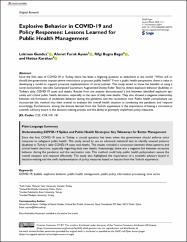Explosive Behavior in COVID-19 and Policy Responses: Lessons Learned for Public Health Management
Citation
LOKMAN, Gündüz, Ahmet Faruk AYSAN, Rıfgı Buğra Bağcı & Hatice KARAHAN. "Explosive Behavior in COVID-19 and Policy Responses: Lessons Learned for Public Health Management." SAGE Open, 14.1 (2024): 1-11.Abstract
Since the first case of COVID-19 in Turkey, there has been a lingering question as elsewhere in the world: ‘‘When will or
should the government impose severe restrictions to protect public health?’’ From a public health perspective, there is value in
developing a model to support proactive implementation of social policies. This study aimed to show the benefits of using a
novel econometric test (the Generalized Supremum Augmented Dickey-Fuller Test) to detect explosive behavior (bubbles) in
Turkey’s daily COVID-19 cases and deaths. Results from the analysis demonstrated a link between identified explosive episodes
and critical public health decisions, especially in the case of daily new deaths. They also showed a negative relationship
between the formation of exuberant behavior during the pandemic and the vaccination rate. Public health policymakers can
incorporate this method into their arsenal to evaluate the overall health situation in combating the pandemic and respond
accordingly. Furthermore, among the lessons learned from the Turkish experience is the importance of having a coronavirus
scientific advisory board in the decision-making process and the ability to promptly implement policy measures.
Source
SAGE OpenVolume
14Issue
1URI
https://journals.sagepub.com/doi/full/10.1177/21582440231224772https://hdl.handle.net/11352/4811



















